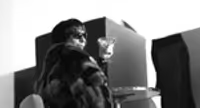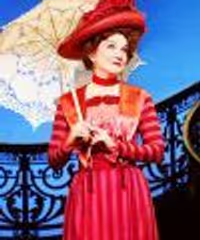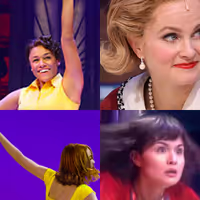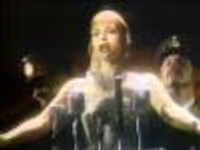GYPSY on PBS
#50GYPSY on PBS
Posted: 11/14/16 at 10:03pm
henrikegerman said: "While it might understandably impress many as the worst Gypsy possible on video, it impressed a great many, including myself, as the definitive Gypsy in the theatre.
They are very different media with very different demands.
"
henrik, I watched Angela play the part in an intimate, 1,200 seat house one day and in a 3,000 seat barn the next day. She never missed a beat, never was too big or too small (even while the rest of the cast fell over each other coping with the larger stage). She would have known how to handle the video. Just saying.
#51GYPSY on PBS
Posted: 11/14/16 at 10:17pm
g.d.e.l.g.i. said: "...when it comes to playing Rose, if you play the woman, they'll see the monster; if you play the monster, they'll see the actress.
"
g.d.e.l.g.i.'s words are so apt and wise, they should be added to the first page of the printed libretto.
#52GYPSY on PBS
Posted: 11/14/16 at 10:36pm
Saying it's unfair to critique a performance because we didn't see it live in the theater is ridiculous. It's put out there for us to see, therefore it will be critiqued.
#53GYPSY on PBS
Posted: 11/14/16 at 10:58pm
GavestonPS said: "g.d.e.l.g.i.'s words are so apt and wise, they should be added to the first page of the printed libretto."
Oh, you're too kind.
But if I may elaborate a little further, Imelda's not the only issue. The other half of it is incidentally the problem with a lot of British productions of American musical comedies. (Gil Varod identified this problem as well, when he reviewed Harvey Fierstein's turn in the David Leveaux revival of Fiddler on the Roof for Broadway Abridged.)
These directors are too busy digging up the dark and "taking it seriously" to remember the form these shows took. Of necessity, there is a contrast between the first and second act in a show like this. If the first half is funnier, it makes the solemn scenes more solemn because the downward spiral of their lives is greater.
I see a lot of people out there saying "Rose's Turn" and the scene that followed were brilliant, and they are! Imelda gives it all she's got! The problem is she's been playing that same character from minute one. There needs to be a warmth and humor. There needs to be layers. She needs to play the woman for the monster to come out of, not the monster to show off her technique.
Broadway Legend
joined: 5/1/05
Blocked: After Eight, suestorm, david_fick, emlodik, lovebwy, Dave28282, joevitus, BorisTomashevsky, Seb28
#54GYPSY on PBS
Posted: 11/14/16 at 11:21pm
Anyway, she may have been good in the theater, but on television, as Arthur would have said, "She stinks."
#55GYPSY on PBS
Posted: 11/14/16 at 11:42pm
PJ, what do you think Arthur would have really thought of Imelda's performance? He was complimentary of Bernadette's performance in a production he despised, but I can't imagine he would've appreciated a Rose who played a screaming maniac from start to finish.
#56GYPSY on PBS
Posted: 11/15/16 at 12:06am
Oh, lord, he would have been blistering.
Whatever you might say about Arthur's use of melodramatic climaxes (the catfight in The Turning Point, the rape in West Side) he prided himself on the subtlety and psychological nuance. He would talk about "earning the audience's reaction" and the danger of resorting to "unearned emotion." Also, liked twists and reveals and things that were "not as they seem at first."
There is no twist in Imelda's Rose, no turning point, no reveal, she is exactly the same at the end as she is at the beginning, and it is all unearned emotion.
The whole idea of Rose being a maniac when she enters Uncle Jocko's is something he would have dismissed as a "directorial notion."
He would have fired the director, taken over himself, and toned down Imelda's performance.
But tears and blood would have been shed in the process.
#57GYPSY on PBS
Posted: 11/15/16 at 12:15am
I believe every word of that. I am sure Arthur could've gotten a better and subtler performance out of Imelda.
The few times I've watched her "Some People," I immediately need to follow it with Patti's version. The difference is drastic. Patti shows frustration, but she also exhibits excitement and optimism as she pleads with Pop like a child, she never once plays it with anger or psychosis like Imelda. Patti and Arthur knew what they were doing.
https://www.youtube.com/watch?v=z6A9vR48Wnc
#58GYPSY on PBS
Posted: 11/15/16 at 1:23am
I was worried Staunton was going to come off the stage and start beating up audience members.
#59GYPSY on PBS
Posted: 11/15/16 at 4:08am
To be fair, Sondheim called Imelda one of the greatest Roses and after calling her Lovett one of the greatest performances he has ever seen he said that when he heard Imelda singing everything's coming up roses for the first time it was like he never heard the song before.
#60GYPSY on PBS
Posted: 11/15/16 at 9:43am
I gotta say, the exaggerated hand gestures I mentioned could easily belong in a Mrs. Lovett performance, even on film. In fact, Helena Bonham Carter's Lovett was missing a bit of that.
#61GYPSY on PBS
Posted: 11/15/16 at 10:28am
imeldasturn said: "To be fair, Sondheim called Imelda one of the greatest Roses and after calling her Lovett one of the greatest performances he has ever seen he said that when he heard Imelda singing everything's coming up roses for the first time it was like he never heard the song before."
He's always been very nice to actors.
She also said he gave her three "fantastic" notes, which she said "are mine only, and which I will not share with anyone." We can just imagine what they were.
Roscoe
Broadway Legend Joined: 5/15/03
#62GYPSY on PBS
Posted: 11/15/16 at 10:32am
I didn't think there was anything so wrong with Staunton's performance that a quick recalibration for video rather than stage wouldn't have fixed -- she was so clearly playing for the folks in the balcony rather than the camera that had zoomed into a tighter than tight closeup that she seemed to be bizarrely overplaying so much of it. There's no denying the brilliance of her Everything's Coming Up Roses.
I'd have forgiven it a lot more if they'd not found found it necessary to remove 99.999% of the humor from the show, making it into some full-on Greek Tragedy with a brass section, and frankly a rather too lackluster brass section. Those cadaverous strippers looked like extras from the Walking Dead, rather than the magnificent Mazeppa, Electra and Tessie Tura.
#63GYPSY on PBS
Posted: 11/15/16 at 10:38am
I thought the video was just awful. Ridiculous. Down to the Gimmick girls- oy vey.
However, I'm willing to concede that it may have played better in the theater. I can't imagine it, but there was SO much praise I have to consider the possibility.
Is there anyone here who saw it in the theater that didn't like it? I really think this production should not have been filmed, in any case.
I LOVED Patti doing it. But I suspect her performance may not translate either.
#64GYPSY on PBS
Posted: 11/15/16 at 8:14pm
I'm starting to believe Gypsy is unfilmable even if shot from the stage. Something just doesn't translate well. Even on the TV movie, Bette Midler was playing to the rafters. Maybe Rose is just a character who is too large for the screen. I feel like Tyne Daly has been one of the few who could have probably brought her to the screen in a realistic way.
#65GYPSY on PBS
Posted: 11/15/16 at 8:29pm
imeldasturn said: "To be fair, Sondheim called Imelda one of the greatest Roses and after calling her Lovett one of the greatest performances he has ever seen he said that when he heard Imelda singing everything's coming up roses for the first time it was like he never heard the song before.
"
I think Sondheim tends to be more "kind" than "fair" when it comes to interpretations of his work. And that is to his credit, IMO.
#66GYPSY on PBS
Posted: 11/15/16 at 8:41pm
PalJoey said: "
Oh, lord, he would have been blistering.
Whatever you might say about Arthur's use of melodramatic climaxes (the catfight in The Turning Point, the rape in West Side) he prided himself on the subtlety and psychological nuance. He would talk about "earning the audience's reaction" and the danger of resorting to "unearned emotion." Also, liked twists and reveals and things that were "not as they seem at first."
There is no twist in Imelda's Rose, no turning point, no reveal, she is exactly the same at the end as she is at the beginning, and it is all unearned emotion...."
I completely agree with PJ and we know what Laurents would have thought because of the "silent bow" he added to the end of "Rose's Turn" for the original London production. I know Angela Lansbury is ancient history for many here, but her Rose really thought she was doing "it" for her kids. It was only during the silent bow after the seemingly endless applause for "Rose's Turn" that a slight change in Angela's facial expression showed us a Rose who was actually, if temporarily, deranged.
It remains one of the most horrifying moments I've seen in a theater.
But it barely registered from Staunton, who had been playing Medea from her opening entrance. (And, yes, I know I said I liked some parts of her performance. I did. But the whole was less than the sum of its parts.)
jonahke
Understudy Joined: 9/25/13
#67GYPSY on PBS
Posted: 12/27/16 at 9:20am
What is actually the reason they only sell the Blu-ray of Gypsy in the USA and not in Europe? (only the DVD is available on Amazon.co.uk)
If you buy the Blu-Ray on Amazon.com, can I watch it here in Europe
ScottyDoesn'tKnow2
Broadway Legend Joined: 1/22/14
#68GYPSY on PBS
Posted: 12/27/16 at 2:30pm
I found a version of this online, but I couldn't make it halfway through Act I. I was really looking forward to this too because I heard great things about Stauton's Rose beforehand. Bernadette Peters' Rose may be the most screen-friendly version of the "recent" Roses as she really wanted to bring out her humanity, even if some felt underwhelmed by her performance on stage. Lupone's Tony performance blew me away obviously but I think she would have been able to translate that appropriately on the screen as well given the right direction. With the right film direction, I'm sure Stauton's performance would have been much better as well.
Videos







